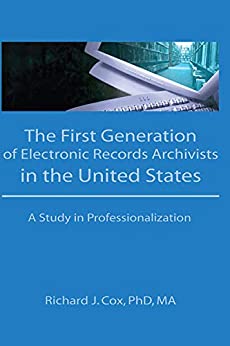Despite more than thirty years of striving to manage electronic records, American archivists have not developed an effective infrastructure for this purpose. The First Generation of Electronic Records Archivists in the United States considers the evidence for this failure by evaluating archival literature on the topic of electronic records management. It examines how position descriptions in state government archives and job advertisements across the discipline have reflected a bias toward paper-based formats, and the failure of graduate and continuing archival education programs to deal effectively with electronic records. The book details:
- state government archives and position descriptions
- trends and practices in the Information Age, 1976–1990
- graduate archival education and electronic records: an analysis of current approaches and their strengths and weaknesses
- the effectiveness of the NAGARA Institute as a form of advanced archival education
- problems, challenges, opportunities, and needs for additional research
The First Generation of Electronic Records Archivists in the United States is an enlightening study for library and information science educators, archival graduate students, and archivists themselves as they work toward the professionalization of their field.











